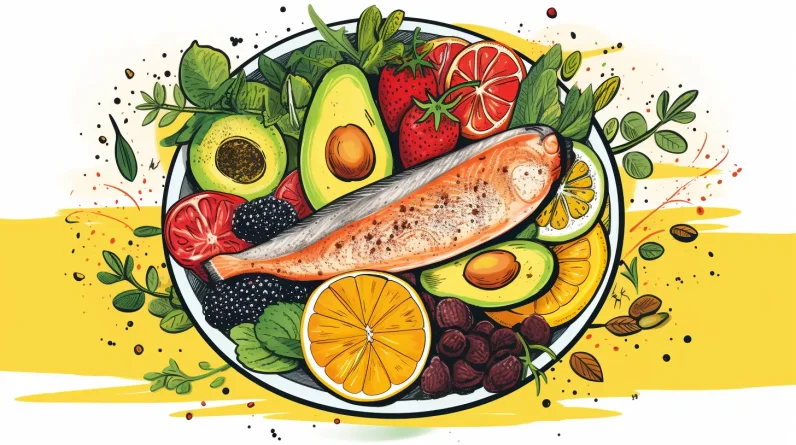
Coincidentally timed with the monthly arrival of Aunt Flo, premenstrual syndrome (PMS) can wreak havoc on a woman’s physical and emotional well-being. But fear not, for there is a powerful ally in your battle against PMS: nutrition. By harnessing the healing power of food, you can ease the symptoms and regain control over your life. In this article, we will explore the impact of nutrition on PMS and provide evidence-based strategies for incorporating a PMS-friendly diet into your daily routine. Get ready to embrace a new level of freedom from PMS discomfort.
Key Takeaways
– PMS is a range of physical and emotional symptoms before a woman’s menstrual period, believed to be related to hormonal changes.
– A balanced and nutrient-rich diet can alleviate discomfort and mood changes associated with PMS.
– Key nutrients to include in a PMS-friendly diet are magnesium, vitamin B6, and omega-3 fatty acids.
– Lifestyle factors such as regular exercise, effective stress management, adequate sleep, and hydration also support managing PMS symptoms.
Understanding PMS and Its Impact on Women
Understanding PMS and its impact on women can be achieved by examining the physiological and psychological symptoms experienced during the menstrual cycle. Premenstrual Syndrome (PMS) refers to a range of physical and emotional symptoms that occur in the days or weeks leading up to a woman’s menstrual period. While the exact cause of PMS is still not fully understood, it is believed to be related to hormonal changes that occur during the menstrual cycle.
Physiological symptoms of PMS can include bloating, breast tenderness, headaches, fatigue, and changes in appetite. These symptoms can vary in severity from woman to woman and can significantly impact their daily lives. On the other hand, psychological symptoms of PMS can include mood swings, irritability, anxiety, depression, and difficulty concentrating. These symptoms can affect a woman’s emotional well-being, relationships, and overall quality of life.
It is important to note that not all women experience PMS, and for those who do, the symptoms can vary in intensity and duration. However, understanding the impact of PMS on women is crucial in order to provide appropriate support and management strategies. By recognizing and addressing the physiological and psychological symptoms associated with PMS, women can take proactive steps towards managing their symptoms and improving their overall well-being.
The Role of Nutrition in Managing PMS Symptoms
A balanced and nutrient-rich diet plays a crucial role in effectively managing the symptoms of PMS in women. Research suggests that certain dietary modifications can help alleviate the discomfort and mood changes associated with premenstrual syndrome.
To start, increasing the intake of complex carbohydrates can help stabilize blood sugar levels and reduce mood swings. Foods like whole grains, legumes, and fruits are excellent sources of complex carbohydrates. Additionally, consuming adequate amounts of protein is important for balancing serotonin levels in the brain, which can improve mood and reduce irritability. Lean meats, poultry, fish, and plant-based proteins such as beans and tofu are good options.
Foods rich in calcium and vitamin D can alleviate PMS symptoms. Low levels of these nutrients have been associated with increased PMS severity. Dairy products, leafy greens, and fortified cereals are excellent sources of calcium, while fatty fish and fortified milk are good sources of vitamin D.
Reducing the intake of caffeine, alcohol, and salty foods can help alleviate symptoms like bloating, breast tenderness, and irritability.
Key Nutrients to Include in Your PMS-Friendly Diet
One important nutrient to include in a PMS-friendly diet is magnesium. Magnesium has been shown to play a crucial role in alleviating the symptoms of PMS. It helps regulate neurotransmitters and hormone levels, which can help reduce mood swings, irritability, and bloating commonly associated with PMS.
Foods rich in magnesium include dark leafy greens, nuts, seeds, and whole grains. Incorporating these foods into your diet can provide you with the necessary magnesium to support your overall well-being during the menstrual cycle.
Another essential nutrient to consider is vitamin B6. This vitamin is involved in the production of serotonin, a neurotransmitter that helps regulate mood. Studies have shown that increasing vitamin B6 intake can help reduce depression, irritability, and fatigue associated with PMS.
Good sources of vitamin B6 include poultry, fish, bananas, and whole grains. Including these foods in your PMS-friendly diet can help ensure you are getting enough vitamin B6 to support your mood and energy levels.
Omega-3 fatty acids are also beneficial for managing PMS symptoms. These healthy fats have anti-inflammatory properties and can help reduce pain, bloating, and breast tenderness.
Sources of omega-3 fatty acids include fatty fish like salmon, chia seeds, and walnuts. Adding these foods to your diet can help decrease the severity of your PMS symptoms.
These key nutrients into a PMS-friendly diet can provide relief from the physical and emotional symptoms associated with PMS. It is important to consult with a healthcare professional or registered dietitian to determine the appropriate amounts and sources of these nutrients for your individual needs.
Foods to Avoid or Limit to Minimize PMS Discomfort
To minimize PMS discomfort, it is advisable to restrict or moderate the consumption of certain foods. While there isn’t a specific diet that works for everyone, making smart choices about what you eat can help alleviate symptoms associated with PMS. Here are some foods that you may want to avoid or limit to minimize PMS discomfort:
Caffeine: High intake of caffeine, found in coffee, tea, energy drinks, and chocolate, can worsen PMS symptoms such as irritability, anxiety, and breast tenderness.
Salty foods: Excessive intake of salt can lead to water retention, bloating, and worsen breast tenderness commonly experienced during PMS.
Alcohol: Alcohol can disrupt hormonal balance and exacerbate mood swings, depression, and fatigue associated with PMS.
Processed and sugary foods: These foods can cause inflammation and worsen mood swings, fatigue, and bloating commonly experienced during PMS.
Fatty foods: High-fat foods like fried foods, fatty cuts of meat, and full-fat dairy products can increase inflammation and worsen PMS symptoms.
It’s important to note that while avoiding or limiting these foods may help alleviate PMS discomfort, individual experiences may vary. It may be helpful to keep a food diary and track how certain foods affect your symptoms to determine what works best for you.
Lifestyle Tips for Supporting a PMS-Relief Diet
To support a PMS-relief diet, individuals can incorporate lifestyle tips that complement their dietary choices. Making certain lifestyle changes can help alleviate the symptoms of premenstrual syndrome (PMS) and promote overall well-being. Here are some evidence-based lifestyle tips to consider:
1. Regular exercise: Engaging in physical activity can help reduce PMS symptoms by releasing endorphins, which act as natural painkillers and mood enhancers. Aim for at least 30 minutes of moderate exercise most days of the week.
2. Stress management: Stress can exacerbate PMS symptoms, so finding effective stress management techniques is crucial. Consider practices such as meditation, deep breathing exercises, yoga, or engaging in hobbies that promote relaxation.
3. Adequate sleep: Prioritizing quality sleep is essential for hormonal balance and overall health. Aim for 7-9 hours of uninterrupted sleep each night to support your body’s natural rhythms.
4. Limit caffeine and alcohol: Both caffeine and alcohol can worsen PMS symptoms. Reduce or eliminate these substances from your diet during the premenstrual phase to minimize discomfort.
5. Stay hydrated: Drinking enough water can help alleviate bloating and fluid retention associated with PMS. Aim for at least 8 glasses of water per day.
Frequently Asked Questions
How Does PMS Affect Women’s Mental Health?
Premenstrual syndrome (PMS) can significantly impact women’s mental health, leading to symptoms such as irritability, mood swings, anxiety, and depression. Understanding the effects of PMS on mental health is crucial for providing appropriate support and interventions.
Can Exercise Help Alleviate PMS Symptoms?
Exercise has been shown to have positive effects on alleviating PMS symptoms. Regular physical activity can help reduce mood swings, bloating, and fatigue associated with PMS. It is an evidence-based, practical approach that can bring freedom from discomfort.
Are There Any Natural Remedies or Supplements That Can Help With PMS Symptoms?
There are natural remedies and supplements that may help alleviate PMS symptoms. These include evening primrose oil, vitamin B6, magnesium, and herbal teas like chamomile and ginger. However, it is important to consult with a healthcare professional before starting any new supplements.
How Long Do PMS Symptoms Typically Last?
PMS symptoms typically last for a few days to a week before the start of menstruation. However, the duration can vary among women. It is important to consult with a healthcare professional for personalized advice and treatment options.
Does Caffeine Consumption Worsen PMS Symptoms?
Caffeine consumption may worsen PMS symptoms. Research suggests that it can increase breast tenderness, irritability, and anxiety. Reducing caffeine intake or switching to decaffeinated alternatives may help alleviate these symptoms.
Conclusion
Adopting a PMS-friendly diet can significantly alleviate the symptoms of premenstrual syndrome in women. By incorporating key nutrients such as calcium, magnesium, vitamin B6, and omega-3 fatty acids, women can experience reduced pain, bloating, and mood swings. Conversely, avoiding or limiting foods high in salt, caffeine, and sugar can minimize PMS discomfort. Additionally, implementing lifestyle tips like regular exercise and stress management can further support the effectiveness of a PMS-relief diet. Ultimately, making these dietary and lifestyle changes can greatly improve the overall well-being of women during their menstrual cycle.







